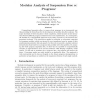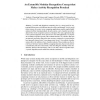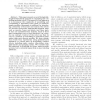1129 search results - page 38 / 226 » Modular Ranking Abstraction |
AGP
1996
IEEE
13 years 11 months ago
1996
IEEE
Compositional semantics allow to reason about programs in an incremental way, thus providing the formal base for the development of modular data-flow analyses. The major drawback ...
CEC
2005
IEEE
13 years 9 months ago
2005
IEEE
Abstract- Decomposing a complex computational problem into sub-problems, which are computationally simpler to solve individually and which can be combined to produce a solution to ...
KI
2010
Springer
13 years 6 months ago
2010
Springer
Abstract. In mobile and ubiquitous computing, there is a strong need for supporting different users with different interests, needs, and demands. Activity recognition systems for c...
WCRE
2009
IEEE
14 years 2 months ago
2009
IEEE
Abstract—The principles and best practices of object oriented design require that modules in a program should match logical decomposition of the knowledge that the program implem...
ICRA
2008
IEEE
14 years 2 months ago
2008
IEEE
Abstract— This paper presents a novel biologicallyinspired hierarchical approach to organizing and controlling modular robots. The purpose of our approach is to decompose the com...



